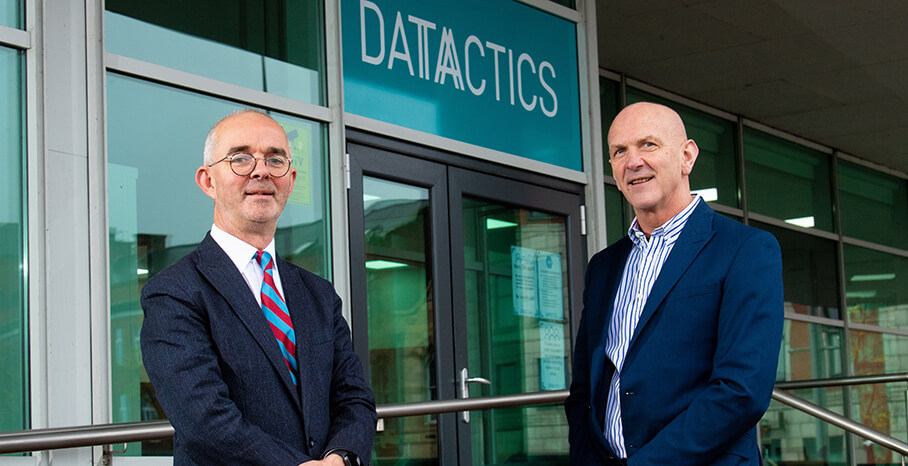Datactics invests over £2m with plans to grow exports and create 18 jobs

Pictured (L-R) is Stuart Harvey, CEO of Datactics with George McKinney, Director of Technology and Services, Invest NI.
Belfast Fintech company Datactics is investing £2.3million in its business, through Research and Development (R&D), skills development and the creation of 18 jobs.
Founded at Ulster University, with Innovation Ulster as a seed investor, the company provides data quality solutions to the financial services sector and central government, using its Datactics Data Quality platform to rapidly measure, match, report and fix data assets.
Once all are in place, the 18 roles will contribute over £700,000 of additional annual salaries to our local economy.
George McKinney, Director of Technology and Services, Invest NI
Stuart Harvey, CEO of Datactics, said: “We’ve seen increasing demand for Artificial Intelligence (AI) and Machine Learning (ML) across the Fintech and Regtech sectors. We’re using this £2.3million investment to take advantage of this growth opportunity which will help us to increase our visibility on the global stage by expanding our team, innovating and driving export growth.
“Invest Northern Ireland’s ongoing support has been fundamental in helping us get to where we are today. The R&D project will use ML to develop new analytics functionalities for our Datactics Data Quality platform. Invest NI’s in-market teams have given us great advice on how to expand in GB and the US, and to enter new markets like Japan and Singapore. By creating 18 jobs, investing in technical, digital and sales skills, and with our new Data Academy for graduates, we will be able to expand our team’s capacity and expertise to secure new sales in these markets.”
Invest NI has offered Datactics £347,601 of support towards the creation of the 18 jobs, R&D and skills development. Job opportunities include software and AI developers, support engineers, and sales and management positions. Five of the roles are in place.
Datactics has also undertaken a Knowledge Transfer Partnership (KTP) with Queen's University Belfast to extend the capabilities of its data quality applications and develop new knowledge-driven analytics.
Invest NI’s in-market teams have given us great advice on how to expand in GB and the US, and to enter new markets like Japan and Singapore.
Stuart Harvey, CEO, Datactics
George McKinney, Director of Technology and Services, said: “Thanks to our dynamic Fintech cluster, Northern Ireland is leading the way in international financial services solutions. As we have continually supported its business journey over the years, I have enjoyed watching Datactics grow and succeed in this sector.
“The Department for the Economy’s 10X Vision identifies Fintech and digital businesses using technology such as AI & Data Analytics as key to shaping Northern Ireland’s innovative future. Datactics will positively contribute to this vision through its investment. This will further enhance both its reputation, and Northern Ireland’s as a leader of innovation, and lead to new export wins and job creation. Once all are in place, the 18 roles will contribute over £700,000 of additional annual salaries to our local economy.”
In recognition of Datactics’ commitment to innovation, it has been awarded a Platinum Level Innovator Certificate from Innovate NI.
Invest NI is committed to driving innovation in Northern Ireland and is a proud partner of Innovate NI, a Department for the Economy programme, helping local businesses innovate successfully. For further information, visit www.innovateni.com
Datatics has also availed of funding from the Bank of Ireland Kernel Capital Growth Fund (NI) and Co-Fund NI, part of Invest NI’s Access to Finance suite of debt and equity funds. The Kernel Capital Growth Fund, Co-Fund NI and Invest NI’s R&D support are part financed by the European Regional Development Fund under the EU Investment for Growth and Jobs Programme 2014–2020.
This support is part funded by the Department for the Economy Economic Recovery Action Plan.


